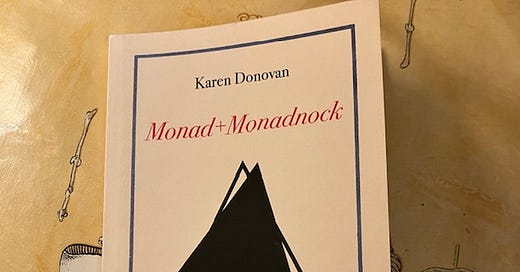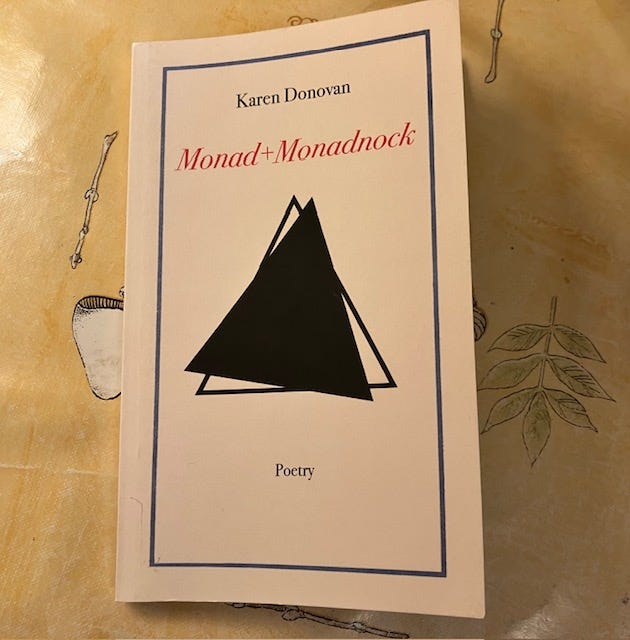THE BEST POET IN AMERICA
Monad+Monadnock, by Karen Donovan
Berkeley, CA : Wet Cement Press, 2022
Your first reaction, upon first reading a truly excellent contemporary poet, is not a sense of edification. Is not even, at the core, pleasure – though both pleasure and edification too are there. No : you feel a sense of liberation.
Liberation… from what? From the drowsy torpor, from the living death, of empty speech. From that continuous, incessant tide of words – not really addressed to us, personally. Vacuous language. The drumbeat of cliché. The sinuous guile at every register (high and low) of sales pitch. Pretentious language : the speech that comes to us pre-packaged, framed for us : great! necessary! important! exciting! healing! redemptive! (Poems by the late Geoffrey Hill, by the way, address this condition very directly.) And finally (needless to say) one feels a sense of liberation… from the vast, suffocating miasma of mediocre poetry.
Monad+Monadnock : much compacted into this brief title. Monad : philosophy; Leibniz, abstraction, science, thought. Also, perhaps, an emblem of the poet – an individual, sole self; a singular small something. Monadnock : a mountain in New Hampshire; a physical, local, particular place; an isolated mountain, a singular large something; a part of the planet. The two are linked by a pun, by onomatopoeia; and the thought-world of the monad, and the actual world of the mountain, are linked by that mountain’s role in American thought, poetry, philosophy – with Emerson and Thoreau, especially. Finally, joining them, not a verbal conjunction, but a mathematical symbol (the plus sign). Or perhaps a cross.
Here’s what you find on the first page of this book :
PARSIMONIOUS
I left with a little stick in my hand.
It seemed right.
I’d been dreaming about straw,
the dry, dry plains of Potemkin.
When I woke the curtains were flaming artistically.
Amazing now to discover all this
reducible to a single theory: stroke deficit.
An old and elegant solution,
though unreconstructed, somewhat reminiscent of
add water –– fill to brim.
Nevertheless my presumptions strode
masterfully down the block.
“Each caplet gets its own egg cup,” I cried.
It was pitiful.
Upon encountering this on the page, I (for one) feel something stirring, some inner vitality, some joy… I feel a sense of liberation.
Today, here, I am not going to write a lengthy, complete review of Karen Donovan’s book. I’m not capable of that. But let’s just observe this single poem for a moment. First off, I become aware of its verbal-conceptual density : a tight-wound spring. And of a disorienting fusion of poetic shorthand, on the one hand – elliptical, gnomic – with simplicity on the other. Directness, a plainspoken lucidity. A kind of efficient speech, near the speed of light. No extra words. But also humorous, comic… suffused with nervous energy. I sense a poet with an imperious desire to communicate something to us. Something powerful, distinct and lasting : but entirely on her own terms. This is what great poets do.
But let me tell you what I (for one, anyway) think I find, in this particular poem :
“Parsimonious” : a word with tendrils both scientific and rhetorical. An elegant theory is parsimonious : a logic of strictly necessary steps. The word almost rhymes with Parmenides, that austere, parsimonious philosopher-poet, that truth-seeker.
The first distich : the “little stick”. Immediately I see blind Oedipus, walking with his cane – the old wreck, embodying the Sphinx’s riddle for “man” (which Oedipus himself solved, long before).
The second distich : “I’d been dreaming about straw…” (in fact the whole poem grows dream-like). “Straw… dry plains… Potemkin…” – images of desiccation, mirage, delusion, fraud : the fictive quality of dreams.
Stanzas 3-5 : “reducible to a single theory : stroke deficit”. Suddenly the infirmity of the cane has worsened to something more drastic : potentially mortal; certainly ominous, re cognition. We are still talking about la condition humaine. This “old and elegant solution… add water –– fill to the brim” perhaps might be referring to Albert Camus’ “only one really serious philosophical problem” – suicide. Or maybe not.
Distich #6-7 : There strides old Oedipus, inflated by his tragic hubris-balloon… carrying his (or her) medicine tablets! “It was pitiful.” Aristotle’s formula for tragedy (evoking terror and pity) closes our scene.
This opening poem jointly flashes with humor, and thunders with tragedy. The whole book repeats this pattern of terse, tart, New England-cranberry couplets – but it races to expand : a multidirectional amalgam of suspense, indeterminacy, irony, hilarity. The theme of dealing with aging and physical frailty is there, but so is a very vibrant, witty, erotic spirit – a wildness, a sweetness, half-tamed in affectionate memory.
But as I said at the beginning, I can’t really do a complete review of this book : it’s beyond me, at least for now. The more I explicate or paraphrase, the more I get in the way. So let me simply close with another brief poem, chosen randomly from this little pocket-size book by Karen Donovan : today (and probably tomorrow) she is the best poet in America.
PLANETARY GEARSET
Well it must be angels, maybe racks and pinions
pitching instructions along gear to gear
to gear to gear, et voilà, complex revolution.
I cruise the suburbs looking for a cutaway view.
Suns rings bodies cogs. Prosaic perhaps,
but down here looks like a whole lot of spinning
with more or less torque, a mechanism that’s not the latest
paradigm. Somebody’s work keeps getting done.
Held parts make a hub, other parts revolve.
Come on, hang in. Hand to hand.
Give it some heart.




